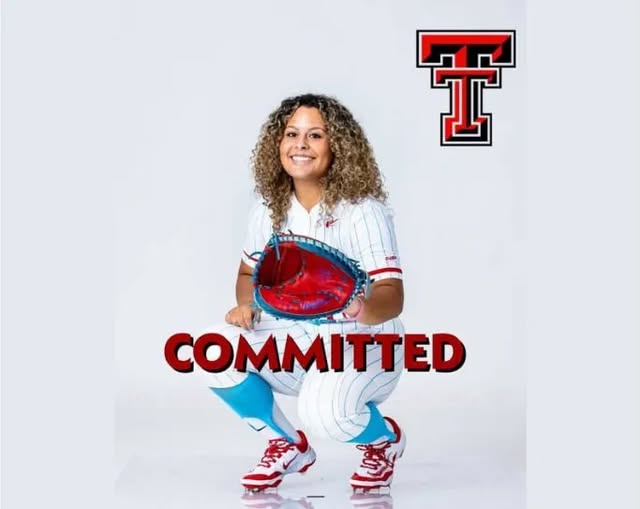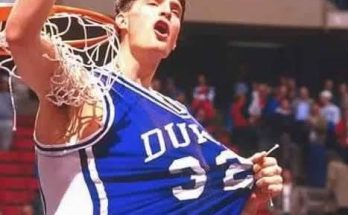The world of college softball is no stranger to dramatic commitments and stunning reversals. However, few stories have sent as many shockwaves through the diamond as the recent decision made by Florida’s former youth phenom, Alexia Carrasquillo. Once hailed as the youngest NCAA recruit in history and a prized verbal commit for the Florida Gators, Carrasquillo’s journey has taken a striking turn. After reportedly facing rejections from several national powerhouses—including Duke, Nebraska, Auburn, and Oregon—she has now committed to the Texas Tech Red Raiders softball program. This unexpected move signals not only a rebirth in her athletic career but also sheds light on the complexities and human elements behind recruiting, rejection, and redemption in the realm of competitive sports.
To understand the magnitude of this moment, one must first appreciate who Alexia Carrasquillo is. Her name began echoing in softball circles across the nation when she became the youngest known recruit in NCAA history. Barely in middle school, Carrasquillo had already captured the attention of the University of Florida’s storied softball program. With a natural left-handed swing that exuded both power and poise, she was seen as a once-in-a-generation talent—one who could eventually become a cornerstone of the Gators’ future. Videos of her hitting home runs over regulation fences at ages when most kids were still learning the fundamentals became viral sensations.
Recruiting prodigies at such a young age comes with a fair share of controversy, and Carrasquillo’s case was no different. Critics argued that the pressure placed on a 12- or 13-year-old to commit to a college trajectory was unfair, while others saw it as a sign of how rapidly the youth sports pipeline was evolving. Nevertheless, Carrasquillo seemed to embrace the spotlight. She had the skills, the poise, and the backing of one of the nation’s most elite softball institutions.
But as the years progressed, the landscape began to shift. NCAA rule changes regarding early recruiting came into play, restricting coaches from engaging with players until September 1 of their junior year in high school. While these rules were intended to protect young athletes from premature commitments, they also reshaped the paths of early-recruited players like Carrasquillo. Suddenly, she and others in her position found themselves in an awkward limbo, needing to reaffirm their value in a system that was trying to correct itself.
When the moment came for Carrasquillo to begin navigating the modernized recruiting landscape under the updated guidelines, she encountered an unforeseen reality: top programs were no longer as interested. Despite her early accolades and prodigious promise, she faced a string of rejections from schools once thought to be ideal fits. Duke, known for its academic rigor and emerging softball presence, passed. Nebraska, a Big Ten force with a deep history, passed. Auburn, with its strong Southeastern Conference pedigree, passed. Even Oregon, a West Coast giant with elite facilities and recent Women’s College World Series appearances, turned her away.
For an athlete who once stood at the pinnacle of her class, the experience must have been jarring. The question many in softball circles began asking was simple: what happened? Had her development stalled? Had injuries or mechanics altered her performance? Or was it simply a matter of other players rising to prominence while Carrasquillo remained tethered to an outdated scouting report from years past?
The truth, as with most stories involving young athletes, is far more nuanced. Carrasquillo, like many teenagers, went through periods of transformation—physically, emotionally, and mentally. Early pubescent success does not always translate seamlessly into elite collegiate performance, especially in a game as technical and strategy-driven as softball. Her swing had to adjust. Her fielding had to evolve. Her mental approach needed sharpening. And perhaps most importantly, she had to contend with the weight of expectations that had followed her since childhood.
During this recalibration period, Carrasquillo found herself caught between what she had been and what she needed to become. Those who watched her closely during this phase saw the beginnings of a mature athlete taking shape—one less concerned with external labels and more focused on internal growth. She dedicated herself to improving not just on the field but as a student of the game. She studied film. She sought feedback from trusted coaches, some of whom had known her since her Little League days. Slowly but surely, the prodigy was forging a second act.
Then came Texas Tech.
Often overlooked in conversations about softball juggernauts, Texas Tech is a program steadily climbing in visibility. Based in Lubbock, the Red Raiders may not have the same national prestige as their SEC or Pac-12 counterparts, but they have been quietly building a competitive and gritty roster, guided by coaches who specialize in player development and who have a keen eye for overlooked talent. To them, Carrasquillo wasn’t a former prodigy past her prime; she was a gem waiting to be polished, a player with battle scars that could translate into leadership and resilience.
The match made perfect sense—not in a headline-grabbing, ESPN-breaking kind of way, but in the deeper, more authentic sense of alignment between program and player. Texas Tech offered Carrasquillo something she desperately needed: belief. In turn, she gave them a player who had weathered storms most athletes never encounter until late in their careers. Her decision to commit to the Red Raiders is more than just a shift in geography. It’s a declaration that she is not defined by her past, by rejections, or by a recruiting system that briefly forgot what made her special in the first place.
Beyond the narrative of redemption, Carrasquillo’s story offers rich educational value for athletes, parents, and coaches alike. First, it’s a masterclass in resilience. It’s easy to celebrate talent when everything is going right, but true character emerges when the path gets rocky. Carrasquillo’s willingness to confront her challenges, to retool her game, and to accept a new reality speaks volumes about her mental fortitude.
Second, her journey is a cautionary tale about the risks of early recruitment. When kids are pushed to make lifelong decisions before they’re even teenagers, the consequences can reverberate for years. Carrasquillo’s experience should serve as a powerful reminder to institutions and families to balance ambition with development. Talent is not static—it evolves, and young athletes must be allowed the room to grow without the suffocating weight of premature expectations.
Third, the case underscores the value of second chances. In a culture increasingly obsessed with instant success and immediate gratification, stories like Carrasquillo’s remind us that growth is often nonlinear. There is beauty and strength in reinvention. There is purpose in persistence. And sometimes, the best chapters come after the supposed storybook ending has been torn apart.
Texas Tech, for its part, stands to benefit immensely. They now welcome into their dugout not just a power-hitting lefty but a player who has learned how to fight, how to adapt, and how to lead by example. Carrasquillo brings with her an unmatched perspective—a unique blend of experience, humility, and hunger that could ignite a cultural shift within the Red Raiders’ roster. Whether or not her name lights up the national stat sheets, her presence is likely to have a ripple effect far beyond the box scores.
In the coming seasons, softball fans across the nation will be watching. Not with the voyeuristic curiosity that once accompanied her every at-bat in middle school, but with a more mature appreciation for the journey she has taken. As Carrasquillo steps onto the field in a Texas Tech jersey, she does so not as a prodigy living off past hype, but as a complete athlete with something to prove—both to the world and to herself.
She may never fully escape the label of “youngest recruit in NCAA history,” and maybe she shouldn’t. But that label now carries new meaning. It no longer defines her; it merely introduces her. What follows is the story of a young woman who stared down rejection, faced her own doubts, and chose to bet on herself anyway.
This second act is not just about softball. It’s about the power of perseverance. It’s about letting go of narratives written too early and crafting new ones on your own terms. It’s about recognizing that success doesn’t always follow a straight line—but that doesn’t make it any less remarkable when it finally arrives.
Alexia Carrasquillo’s commitment to Texas Tech is more than a headline. It is a declaration: that the best stories in sports aren’t just about championships and stats, but about heart, grit, and the courage to keep going. And in that sense, she may have already won something more meaningful than any title—she’s won control over her own story.



